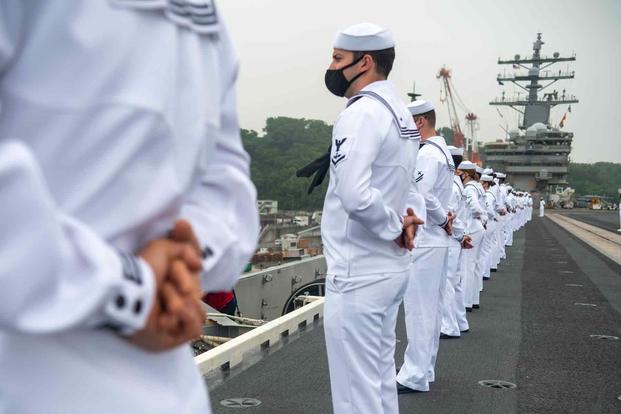After more than a year of grueling Navy deployments that left ships at sea for months on end with no port visits, leaders announced that some of the strict restrictions put in place during the pandemic will be lifted for immunized personnel.
Sailors who've been fully vaccinated against COVID-19 or had the illness caused by the novel coronavirus in the past three months will no longer be required to quarantine before deployments, Vice Adm. Phillip Sawyer, deputy chief of naval operations for operations, plans and strategy, wrote in a new force-wide message issued Monday. The change applies to personnel on ships, submarines and aircraft, he said.
Anyone who has declined the vaccine and hasn't built up antibodies for COVID-19 through an infection in the last three months will still be required to sequester for 14 days before deployments. Those personnel will also be required to take COVID-19 tests before deploying.
Read Next: 'Nicest Ship I Have Been On': Marine Colonel Sounds Off on British Aircraft Carrier
Immunized sailors will also get the OK to make port calls in some spots with U.S. military facilities, including Guam, Bahrain and Japan, where they can use gyms, commissaries and other base services, Sawyer said. Fully immunized sailors can also stop wearing face masks and social distancing from others in most situations, his message states.
"With more than a year operating in the COVID environment, we have gained significant expertise in mitigating and preventing the spread of COVID-19," he said in a news release announcing the changes. "Now with vaccines and [Centers for Disease Control and Prevention] scientific data, we are able to relax many of the procedures we put in place and still provide for the health protection of the force."
The coronavirus pandemic wreaked havoc on military operations, particularly missions on ships and submarines, where social distancing in tight quarters is nearly impossible. Early in the pandemic, a massive COVID-19 outbreak on the aircraft carrier Theodore Roosevelt left the ship stuck in Guam for weeks as nearly the entire crew was moved ashore to quarantine.
More than 1,200 sailors on that ship tested positive for the virus, and one died.
Since then, crews have been required to stretch time away from their families by boarding ships early for quarantine periods ahead of deployments. Deployed crews also stopped making most port calls, leaving some at sea for about 300 consecutive days.
Sawyer said the Navy is now seeing the military's highest vaccination rate and the lowest number of COVID-19 cases. He credited sailors, Navy civilians and contractors for assuming "personal responsibility" to stop the spread of COVID-19, which has killed 26 service members and infected nearly 39,000 Navy personnel.
So far, more than 230,000 Navy and Marine Corps personnel have been fully immunized, the message states. Marines, who routinely deploy on Navy ships, have shown some resistance to the shots, though. As of April, nearly 40% of the 123,000 Marines who had the chance to receive the COVID-19 vaccine had turned it down.
"We must continue to pursue full vaccination and apply best health protection measures both at home and at work to sustain and improve upon this performance," Sawyer said.
"The science is pretty clear," he added. "Vaccinations are key to best protecting our sailors. The more sailors that are vaccinated, the better for them, their families, the Navy and the nation."
-- Gina Harkins can be reached at gina.harkins@military.com. Follow her on Twitter @ginaaharkins.
Related: Hundreds of Marines Get Heart Exams in Study About COVID's Effects on Young People













